How to Format SD Card Using CMD Windows 11/10/8/7
| Workable Solutions | Step-by-step Troubleshooting |
|---|---|
| Use CMD on Windows 11/10/8/7 | Step 1. Type cmd in the search box in Windows 11/10, right-click on Command Prompt, and choose "Run as administrator"...Full steps |
| Use CMD Alaternive - Qiling SD Card Formatter | Step 1. Launch Qiling Partition Master, right-click the partition on your external hard drive/USB/SD card which you want...Full steps |
| Use Two Windows Built-in Tools |
Method 1. Perform SD Card Formatting...Full steps Method 2. Use Disk Management to Format SD Card...Full steps |
Why Do You Format SD Card
Formatting an SD card allows users to change the file system to NTFS, FAT32, or exFAT, making it compatible with various devices and operating systems, such as Windows, Mac, and Android, and enabling features like larger file storage and improved compatibility with different file types.
- Reset SD card file system on a specific device, The device is a digital camera, Android smartphone, game console, music player, etc. that captures, records, and plays back audio and video content.
- Fix or repair a problematic SD memory card from corruption, damage, inaccessibility, etc.
- Clean up the SD card, remove all files and restore its full capacity.
- Review and prolong the SD card's lifespan.
When advanced Windows users suggest a solution to fix issues with an SD card, they may recommend formatting the SD card using the Command Prompt (CMD).
Formatting an SD card can be done using the Diskpart CMD command in Windows, and we'll show you the complete procedure for doing so on Windows 11, 10, 8.1, 8, 7, XP, and Vista. We'll also cover alternative formatting tools.
- Important
- Formatting a device involves deleting all data and setting it up as a brand new one. Before doing so, it's essential to make a full backup of your data to prevent loss in case you need to restore it.
How to Format SD Card Using CMD on Windows 11/10/8/7
Format Tool:DiskPart CMD
Diskpart is a built-In Windows, you can use a tool called Diskpart to manage your hard drives, including formatting damaged or corrupted internal or external hard drives, USB drives, SD cards, and more. However, this method is somewhat advanced and not recommended for those who find it difficult to navigate the process.
Hint: If you're a Windows beginner, consider trying Method 2 or Method 3 instead. These alternative methods may be more suitable for those new to using Windows.
If you're not familiar with CMD, you can use a professional formatting tool to format your SD card risk-free. Alternatively, if you prefer to use CMD, here's a step-by-step guide on how to format your SD card using CMD in Windows 11/10:
Step 1. To run Command Prompt as administrator in Windows 11/10, type "cmd" in the search box, right-click on Command Prompt, and select "Run as administrator".
Step 2. In the command prompt window, type diskpart and press "Enter".
Step 3. Type list disk to list all the available drives and press "Enter".
Step 4. Type "select disk + disk number" (for example, select disk 2) to select the SD card you want to format and press "Enter".
Step 5. Type list volume and press "Enter".
Step 6. Type select volume+ volume number(or example, select volume 10) and press "Enter".
Step 7. To format the drive, type `format fs=ntfs` (or `format fs=exfat`) and press Enter. This will format the drive with the specified file system, either NTFS or exFAT.

To format a drive in Windows using DiskPart, first, open Command Prompt as an administrator. Then, type `diskpart` and press Enter to open DiskPart.
If you've accidentally formatted other hard drives, don't panic, as there are powerful data recovery applications available to help you recover data from a formatted hard drive with ease.
Also read:
Fix Corrupted/Damaged SD Card Without Losing Data
If your Micro SD card is corrupted or not reading, you can try fixing it on your own by following a step-by-step guide. First, you can try to recover data from the corrupted SD card using a data recovery software. If that doesn't work, you can try formatting the SD card, which will erase all data on it. If the SD card is still not readable, you can try using a card reader to connect it to your computer and see if it can be detected.
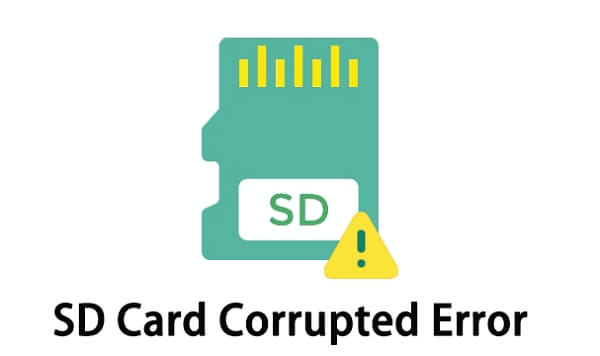
How to Format SD Card Using CMD Alaternive - Qiling SD Card Formatter
Format Tool: Qiling Partition Master
For a simpler and more secure way to format an SD card, consider using third-party SD card formatting tools like Qiling Partition Master, which can help format a damaged or corrupted memory card in Windows 11/10/8/7, and also offers free partition management features to organize and optimize hard drives.
To format an SD card, download and install a free partition manager on your PC, then follow the easy steps to complete the task, regardless of the operating system you're using.
Step 1.Launch Qiling Partition Master, select the partition on your external hard drive/USB/SD card that you want to format, and choose the "Format" option.

Step 2. Assign a new partition label, file system (NTFS/FAT32/EXT2/EXT3/EXT4/exFAT), and cluster size to the selected partition, then click "Proceed".
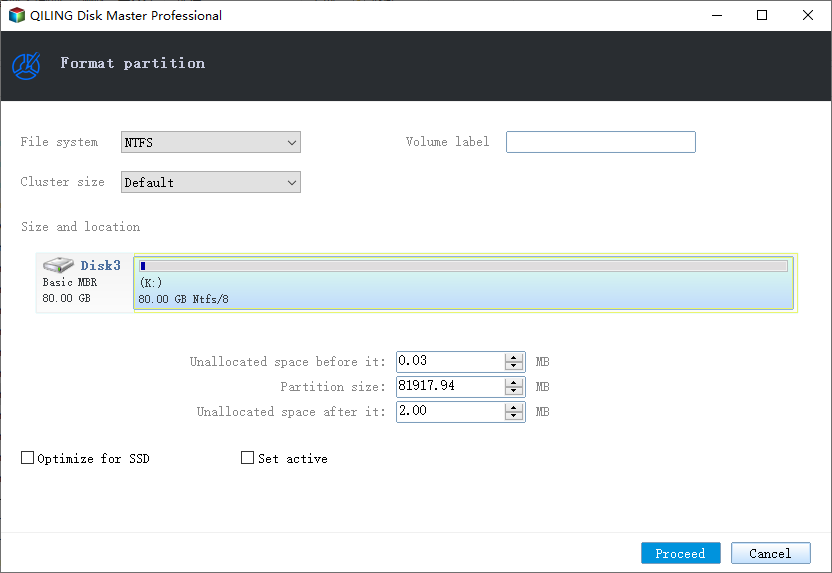
Step 3. To start formatting your external hard drive, USB, or SD card, click "OK" in the Warning window.
Hint: If the SD card is larger than 4GB, you can only choose FAT32, NTFS, or EXT2/EXT3, but if it's smaller, you can also select FAT.
This tool allows you to perform various disk and partition operations, including formatting, resizing, and moving disks or partitions, as well as merging, migrating, and copying them. You can also use it to convert disks to local storage, change labels, defragment disks, check and explore partitions, and more.
How to Format SD Card Using Two Windows Built-in Tools
Apart from using a computer or card reader, you can also use Windows utilities to format an SD card. This can be done using the Windows quick format feature or Disk Management, both of which are built-in tools that allow you to quickly and easily format the memory card.
Method 1. Perform SD Card Formatting Use File Explorer
To format your SD card, first connect it to your computer. Then, follow the steps to format the SD card, which can be found in the tutorial.
Step 1.Press "Windows key + E" to bring up theWindows Explorer.
To access the computer, click on the "Start" button and then click on "Computer" in Windows 7 or "This PC" in Windows 11/10.
Step 2.Right-click on the connected SD card and select "Format".
Step 3.On the format window, you'll be asked to select the desired file system, which is set to NTFS, or FAT32 for 32GB SD cards and exFAT for 64GB SD cards.
Step 4.Click "Start".

Windows Was Unable to Complete the Format
You may encounter the "Windows was unable to complete the format" issue when trying to format a USB drive. To resolve this, you can try to fix the issue or explore alternative methods to format the drive.

Method 2. Use Disk Management to Format SD Card
Step 1.Right-click on "Computer" or "This PC" and select Management, then go to Disk Management under the Storage section.
Step 2.Right-click on the SD card partition and select "Format".
Step 3:To format a drive, select the drive in the format window and check the box next to "Perform a quick format". Then, choose a file system and allocation unit size.
Step 4:Click "OK".

Bonus Tips - How to Protect SD Card Data
Formatting an SD card can be done for several reasons, including completely removing data, fixing a damaged file system, or resolving corruption issues. However, keep in mind that formatting will result in data loss, so it's essential to consider data protection methods beforehand.
Tip 1. Back Up Data Before Formatting
To avoid further data loss, it's essential to back up files regularly on a storage device like an SD card. You can manually copy and paste files from the SD card to another location or use free backup and recovery software, such as Qiling Backup, to schedule and run backups automatically. This way, your system, files, disks, or partitions can be backed up in just 5 minutes, whether it's an individual photo or the entire C drive.
Steps to back up the SD card with Qiling Backup:ckup:
Step 1.To start a file backup, click the "File backup" button located in the Backup and recovery page. This will initiate the backup process.
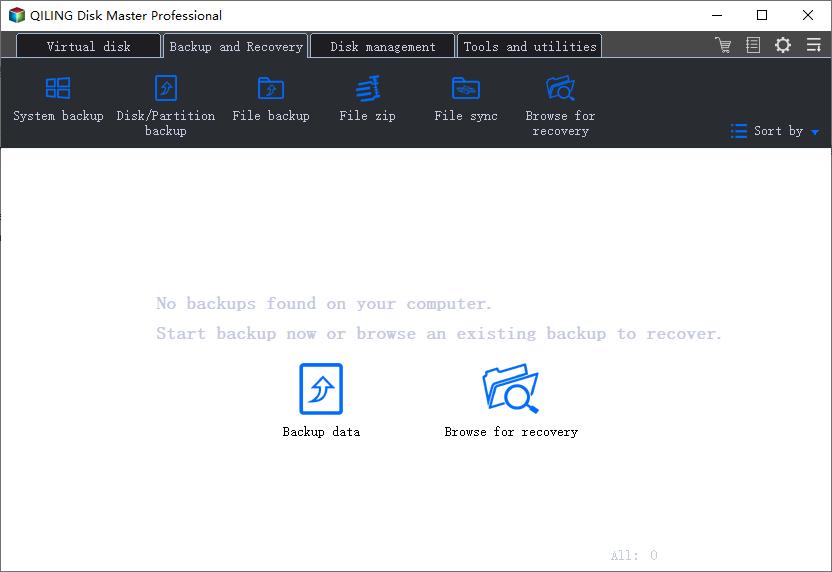
Step 2.Files from both local and network locations will be listed on the left, allowing you to expand directories and select the files to be backed up.
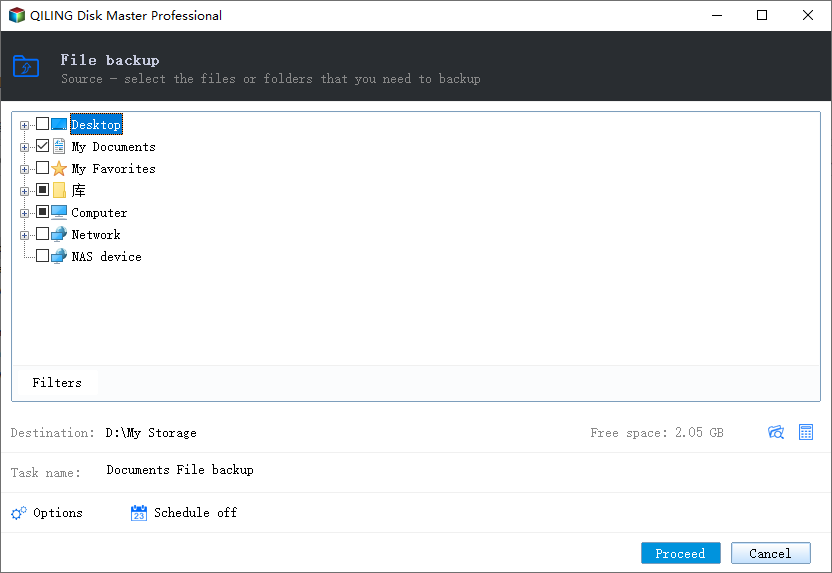
Step 3.Follow the on-screen guide to select the destination where you want to save the backup.
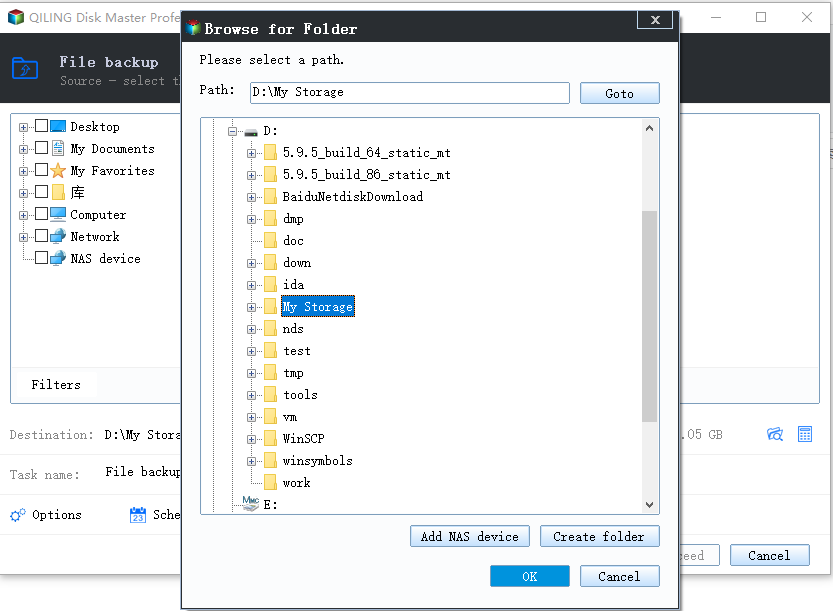
The user can click "Options" to encrypt the backup with a password, set a backup schedule, and choose to start the backup at a certain event in the "Backup Options" and "Backup Scheme" sections. Additionally, there are other customizable options available.
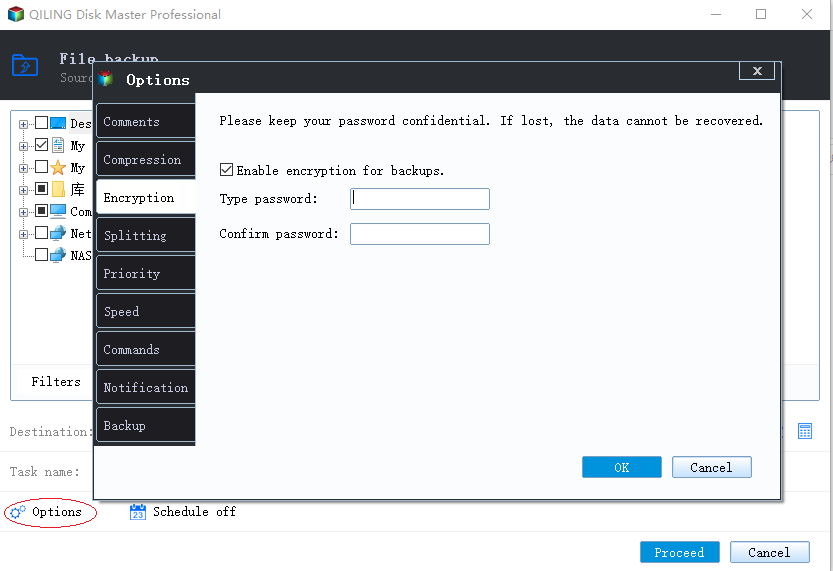
Step 4.You can store the backup to a local drive, Qiling's cloud service, or a Network-Attached Storage (NAS) device.
Step 5. Qiling Backup allows users to back up data to both third-party cloud drives and its own cloud drive.
To back up data to a third-party cloud drive, select Local Drive, scroll down to add a Cloud Device, add and log in to your account.
Step 6.Click "Proceed" to start the backup. Once completed, the backup task will be displayed as a card on the left panel, allowing further management by clicking on it.
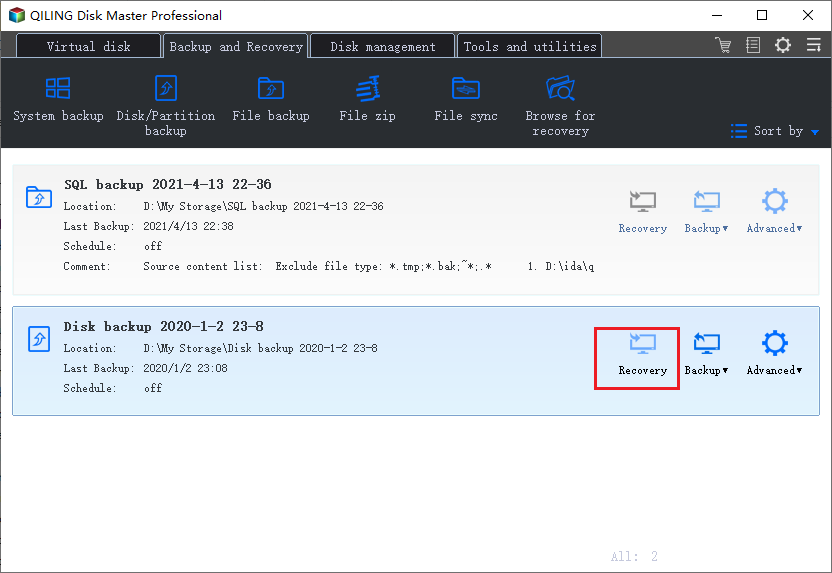
Tip 2. Safely Eject the Card from a PC
To safely eject an SD card, you should stop any ongoing data transfer or access, and then remove the card from the device. This helps prevent data corruption or loss. You can do this by going to the device's settings or file manager, looking for the option to safely remove or eject the SD card, and then confirming the action.
Tip 3. Don't Use One Card on Many Devices
Using the same memory card on multiple devices can cause it to fail due to incompatibility with different file systems, leading to the card's premature death. It's best to use a separate memory card for each device to prevent this issue.
Tip 4. Stop Using the SD Card When Getting Any Errors
If your SD card starts showing errors like "not detected" or "write protected", stop using it right away to prevent further damage.
Conclusion
If you're not comfortable using the command line or Windows tools, you can format your SD card using Qiling Partition Master, which offers a user-friendly interface and a range of additional features beyond just formatting, such as converting file systems and disk types.
Extended Reading: What Else Can CMD Do Besides Formatting SD Card
If you're looking to format an SD card, we've got you covered. On this page, we've guided you through the process of formatting an SD card using CMD or alternative formatting solutions on Windows 11/10/8.1/8/7. In addition to formatting, CMD can also be used for other tasks, such as running disk checks, creating bootable USB drives, and more. We've collected three major solutions and provided step-by-step guides on how to use them successfully on your SD card.
Feature 1. Check and Fix SD Card Corrupted Error with CHKDSK Command
- Connect SD card to computer.
- Run Diskpart, and type the command lines here: chkdsk E:/ f /r /x, and hit Enter.
Replace E: with the drive letter of your SD card. Here are the syntax meanings:
- /F: Check for disk errors, not bad sectors.
- /R:Locate the bad sectors on the target hard disk and try to recover the readable information from the bad sectors (implies /F).
- /X: Forces the volume to dismount first, if necessary. It also includes the functionality of /f.
Feature 2. Delete All Partitions and Clean Up SD Card One-Time with Clean Command
- Connect SD card to computer.
- Type the command below in DiskPart one by one and hit Enter each time:
- list disk
- select disk 2 (Replace 2 with SD card drive number)
- clean
The clean command will delete all existing partitions and files on your SD card, restoring full capacity to your card.
Feature 3. Remove Write Protection from SD Card with Clear Readonly Command
- Connect SD card to computer and open DiskPart
- Type the command below one by one and hit Enter each time
- list disk
- select disk 2 (Replace 2 with the SD card drive number.)
- attributes disk clear readonly
If you're interested in learning more about using the Command Prompt (CMD) to troubleshoot and fix issues with your SD card or other storage devices, you can check out our articles or use the search function on our website for helpful tutorials and guides.
Related Articles
- How to Fix Windows 11 Antimalware Service Executable High CPU Usage
- Top 7 Best Partition Recovery Software for Windows 11/10/8/7 in 2022
- Master Boot Record of This Hard Drive Is Damaged | Fix MBR Windows 10/8/7/Vista/XP
- Effective Fixes for Windows Was Unable to Complete the Format SD Card and USB Drive